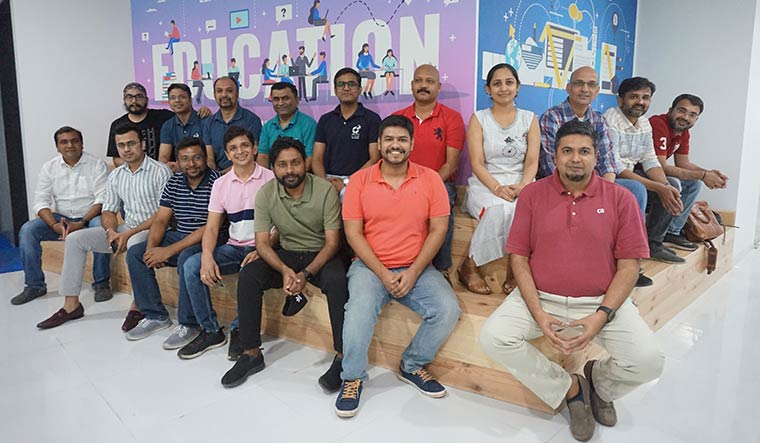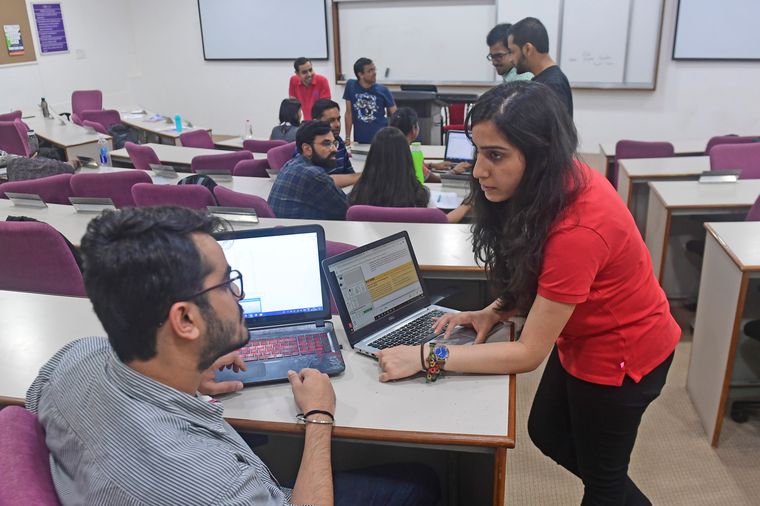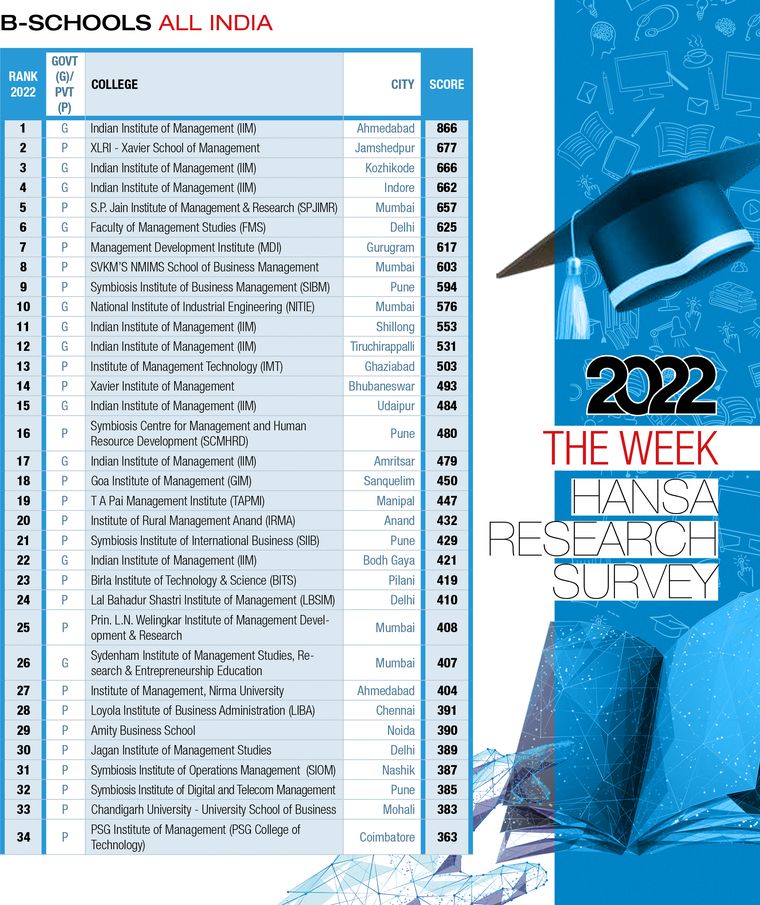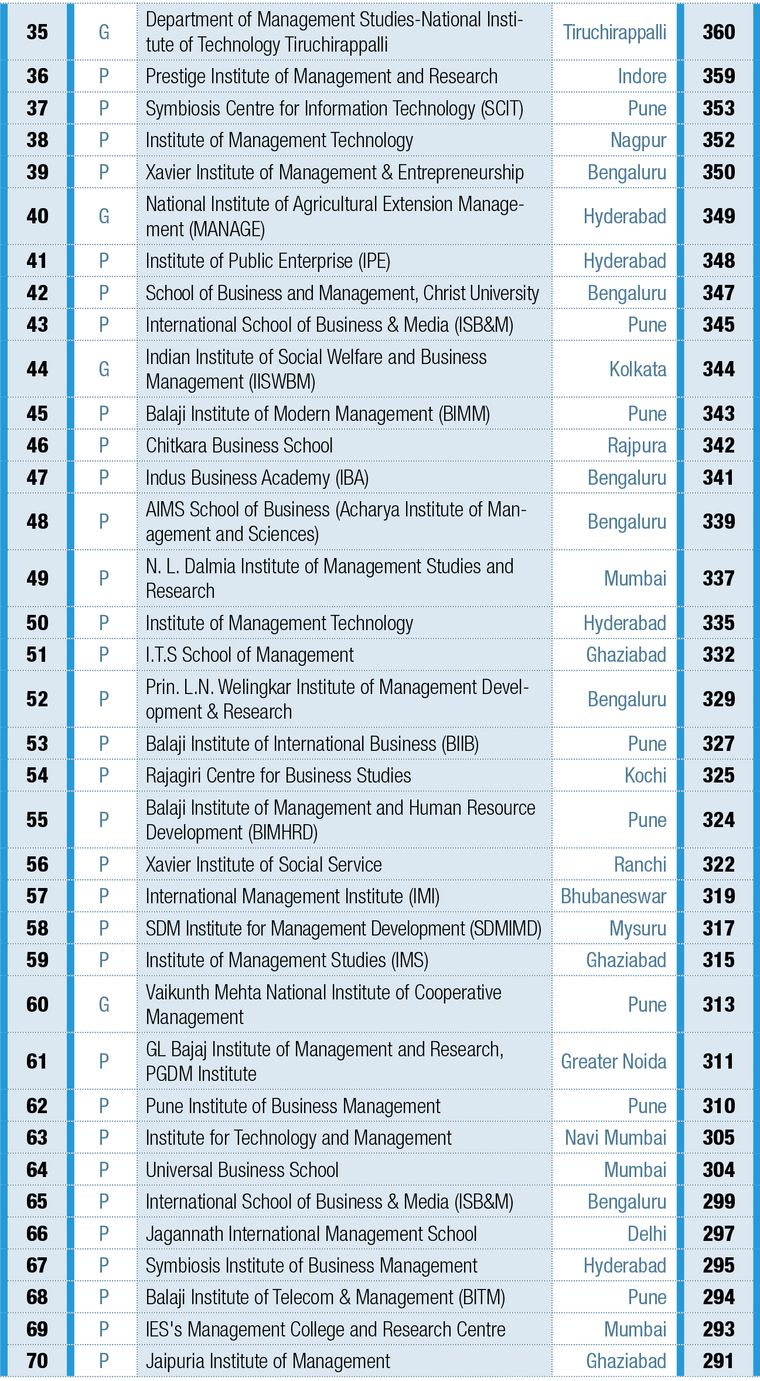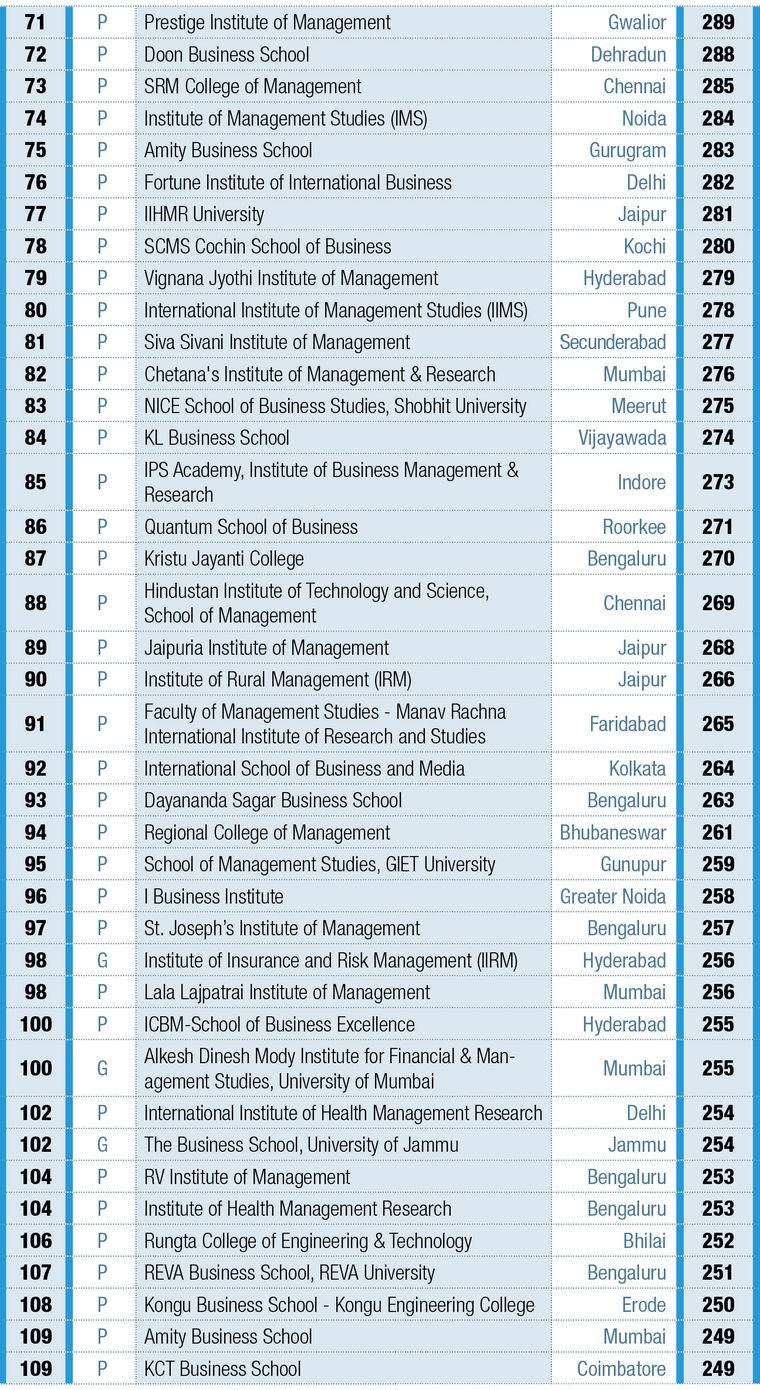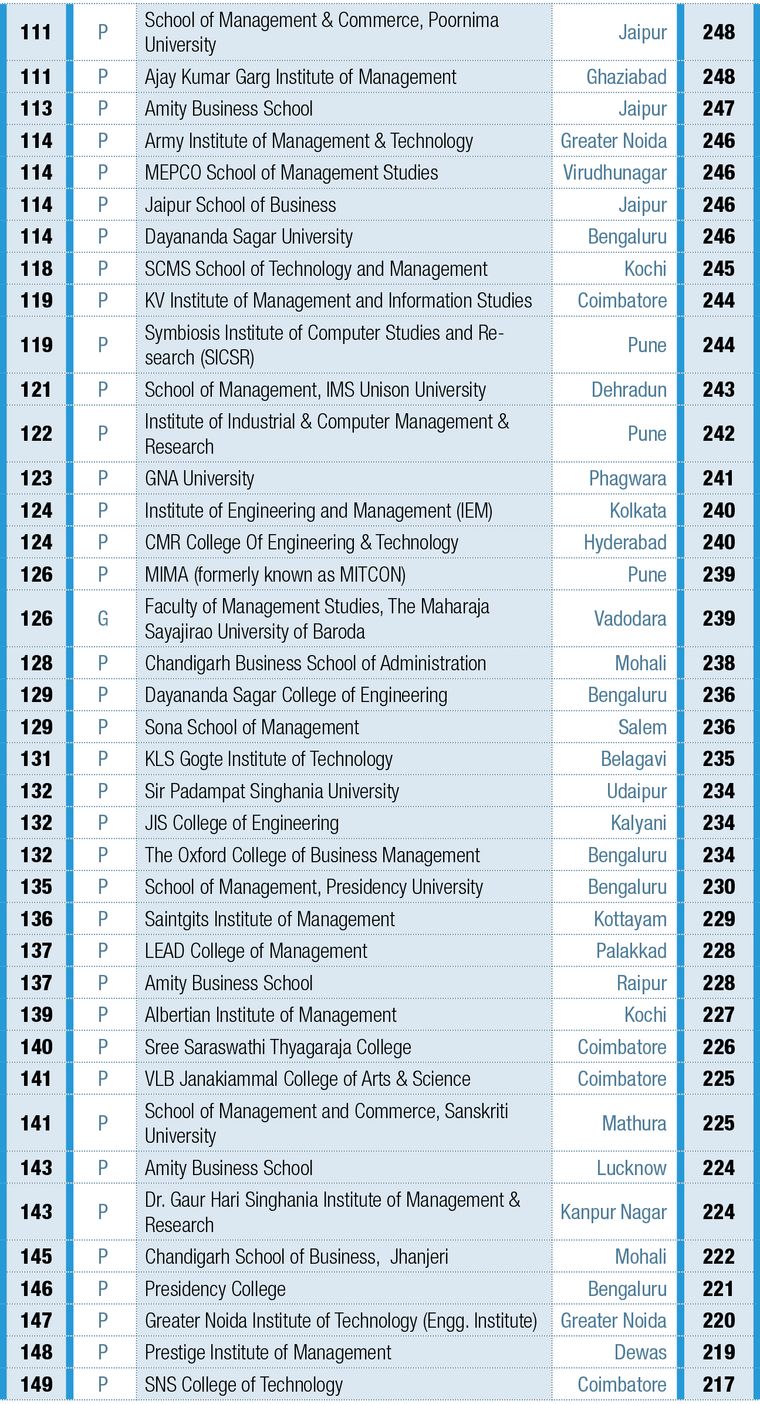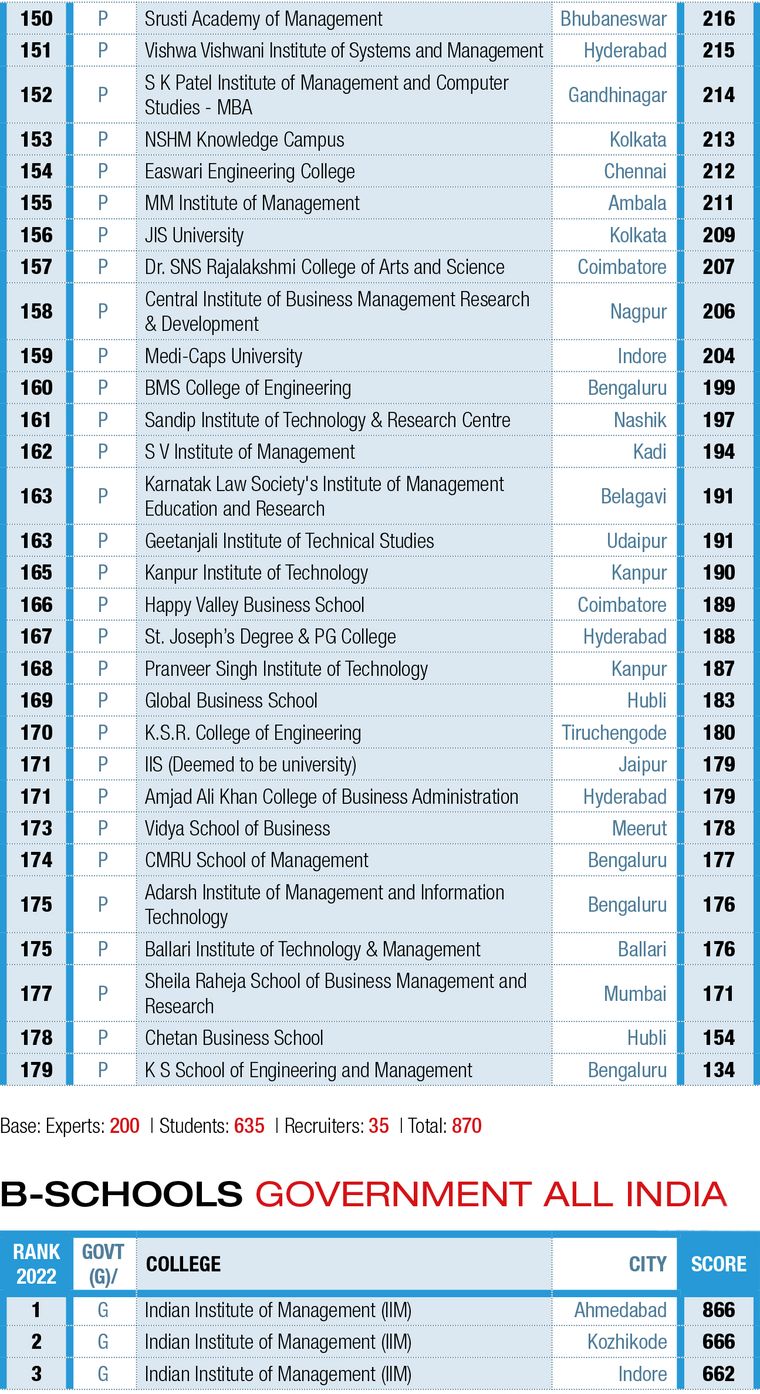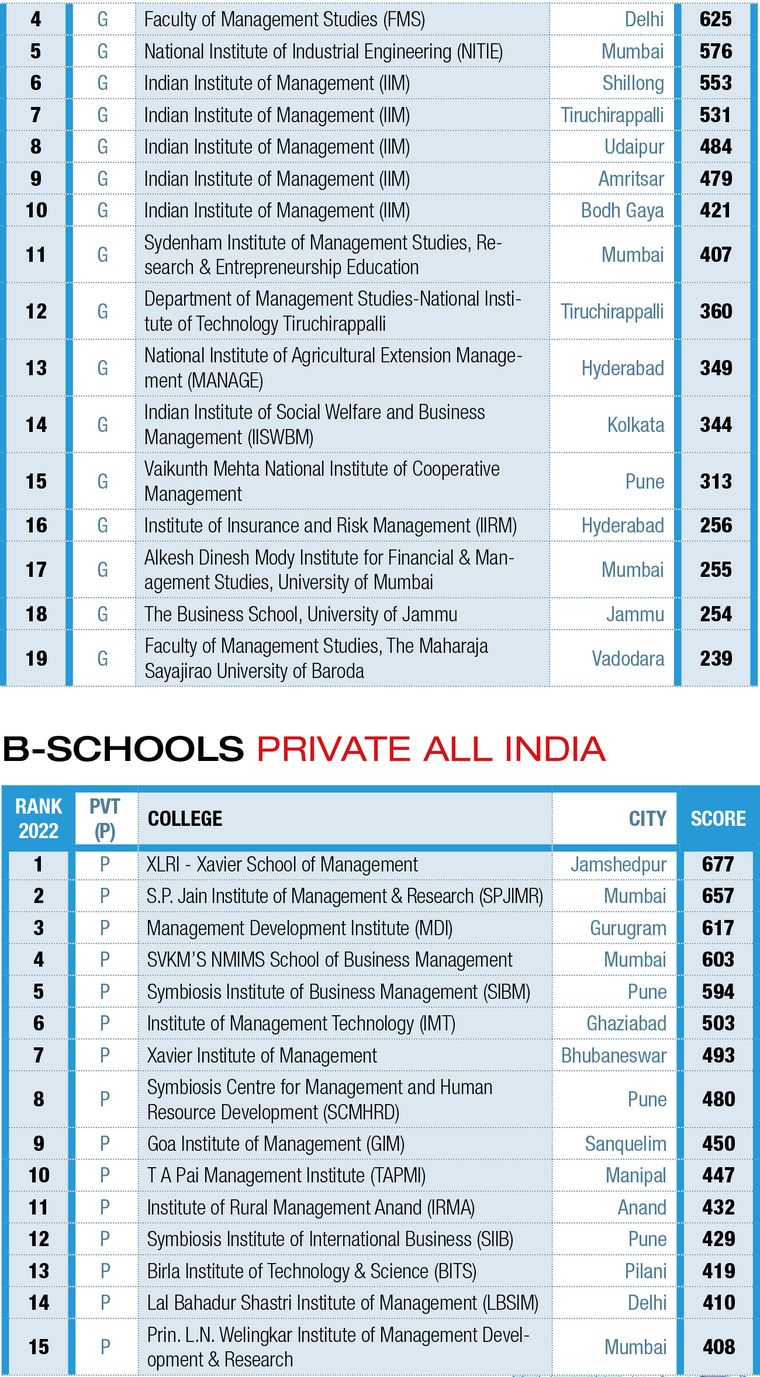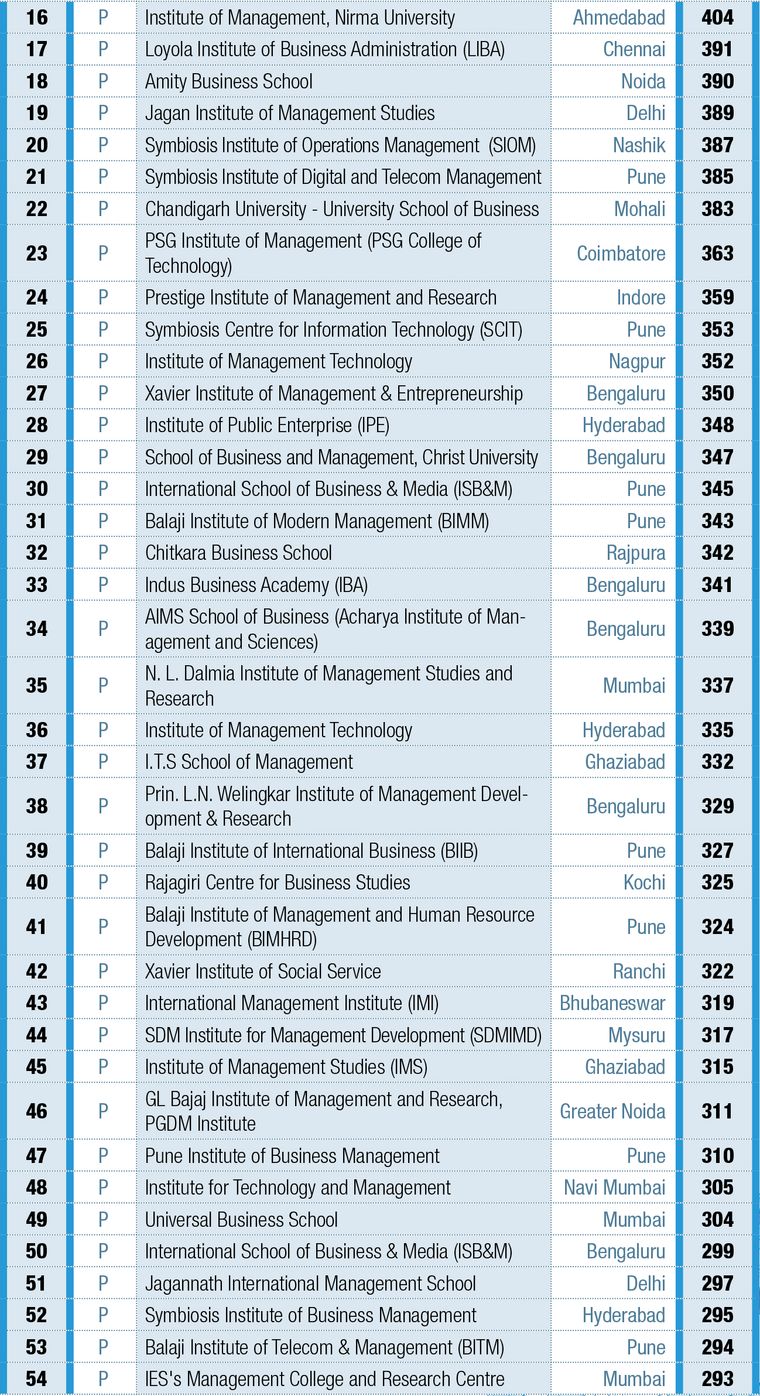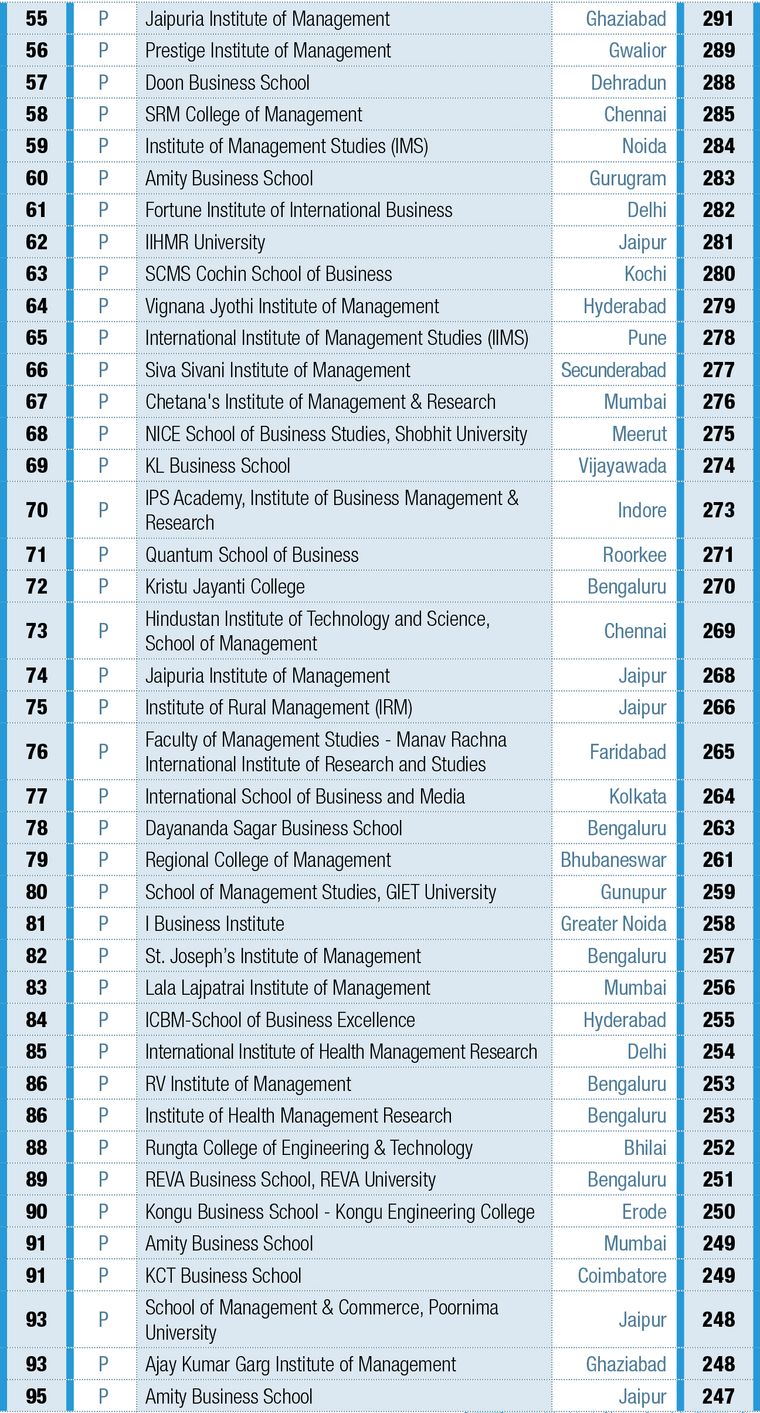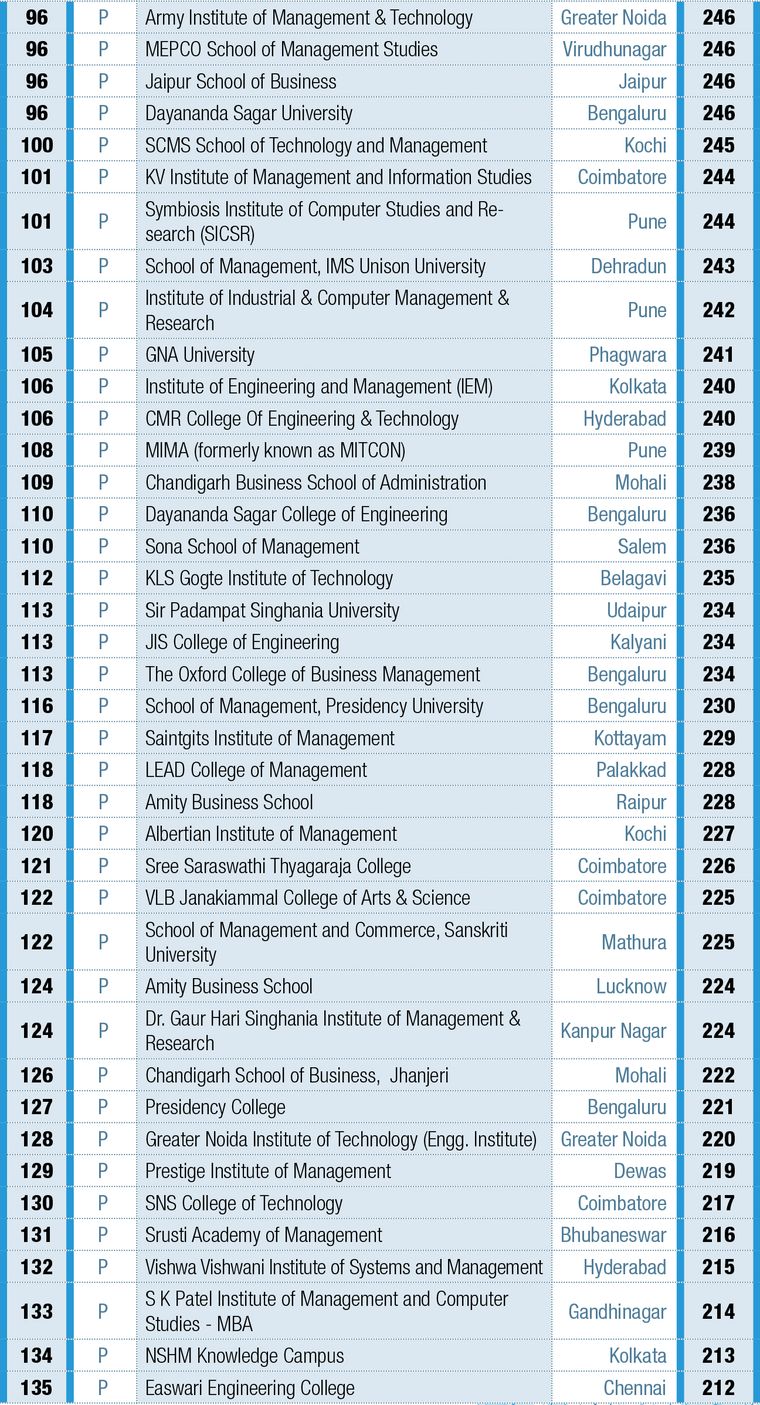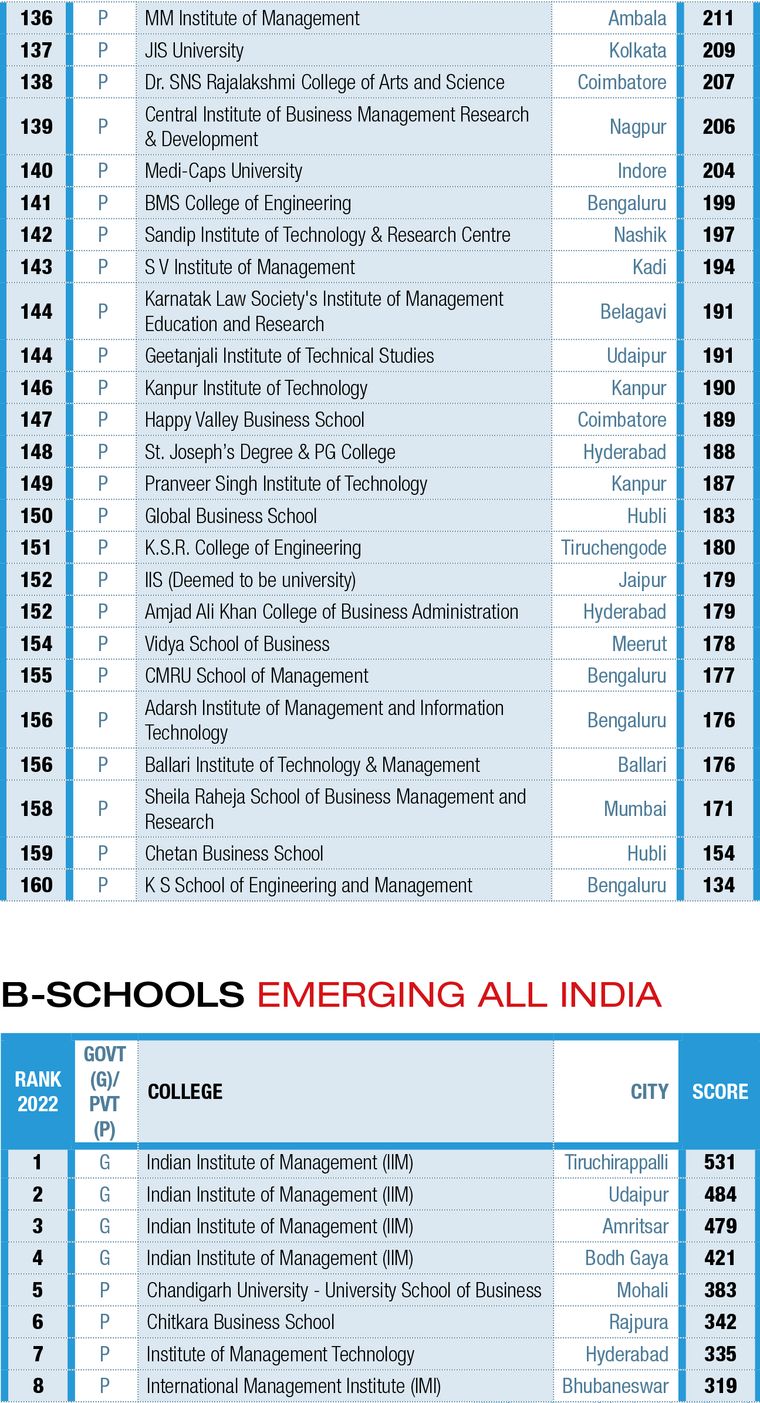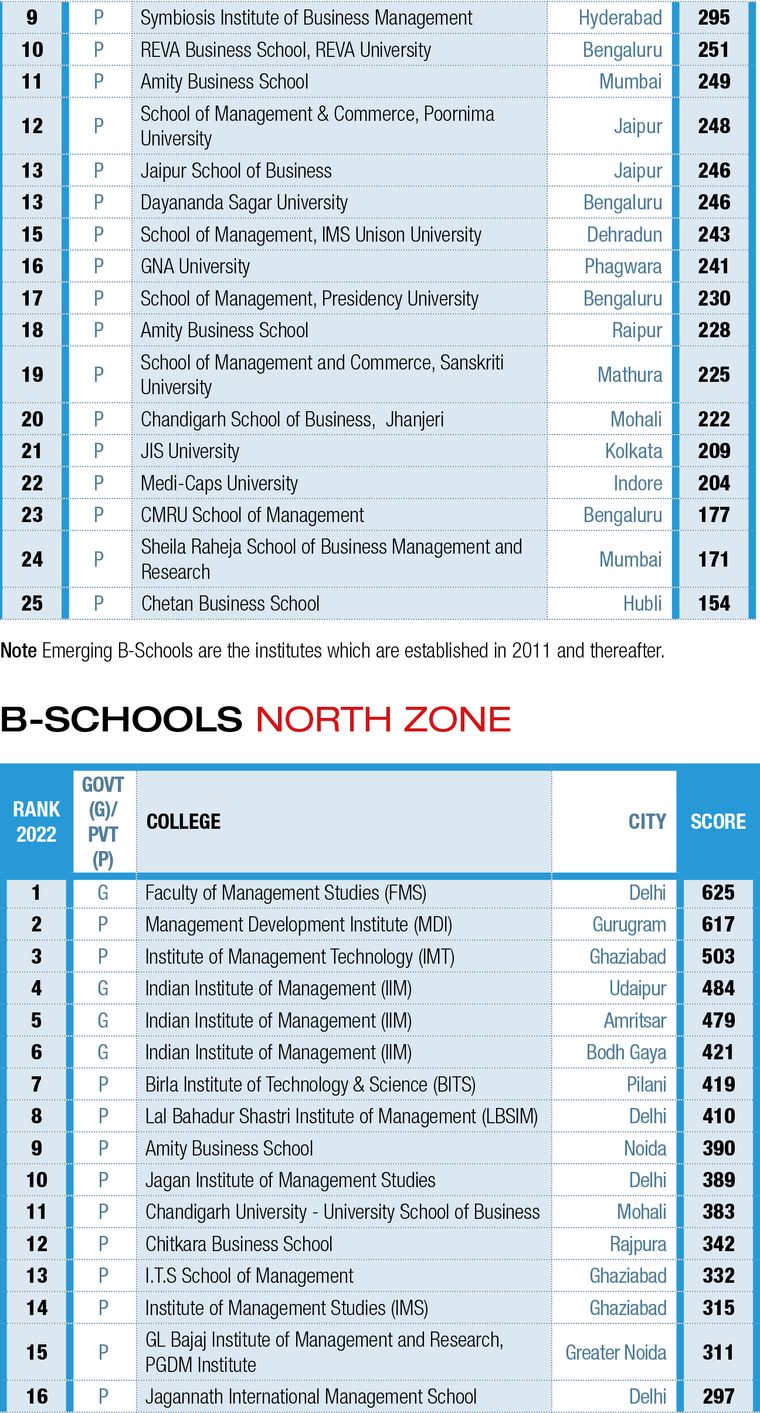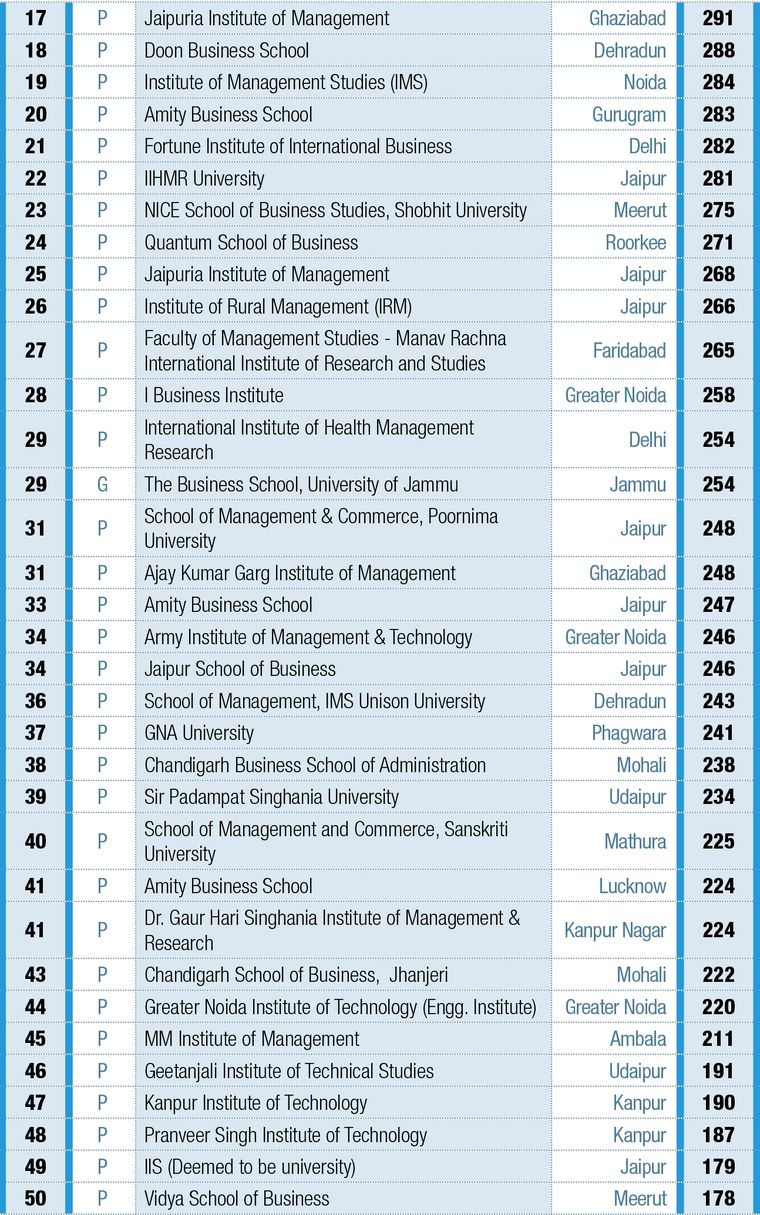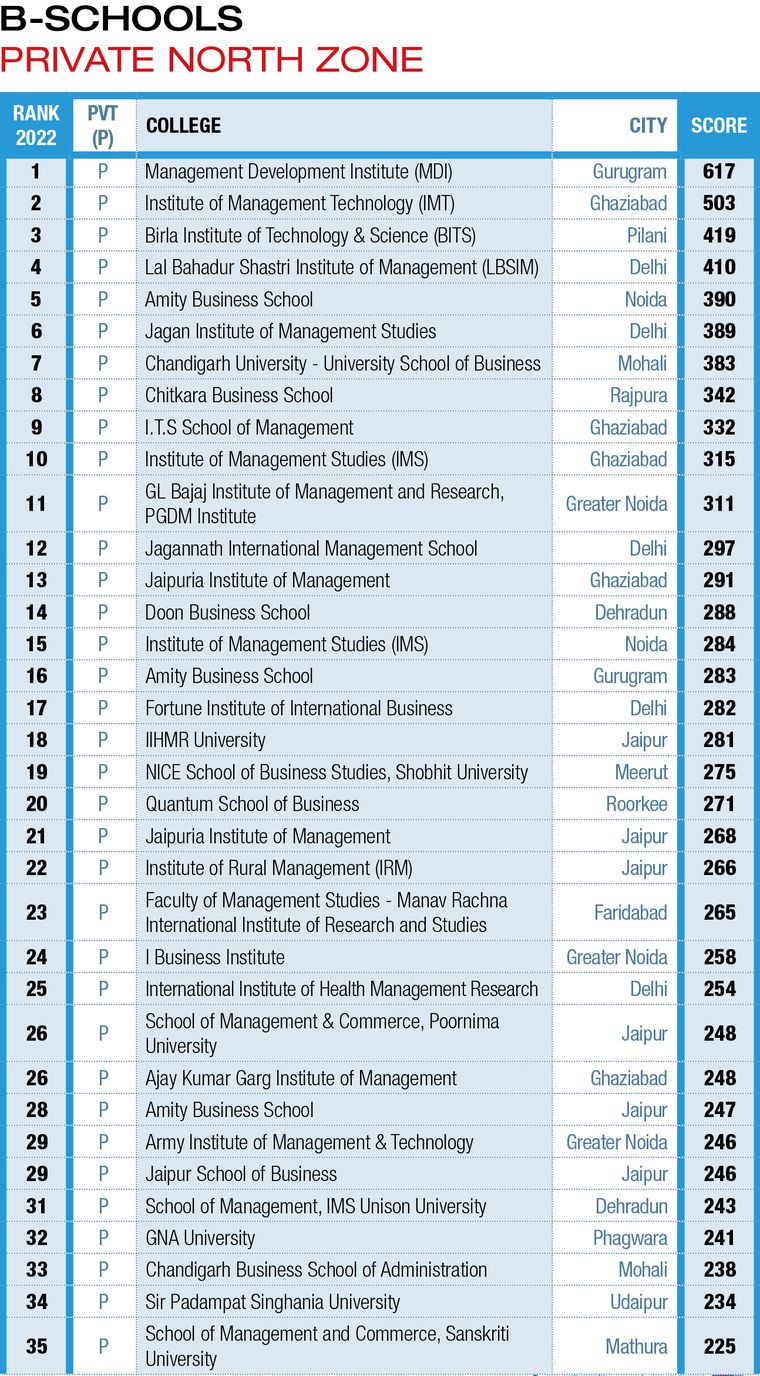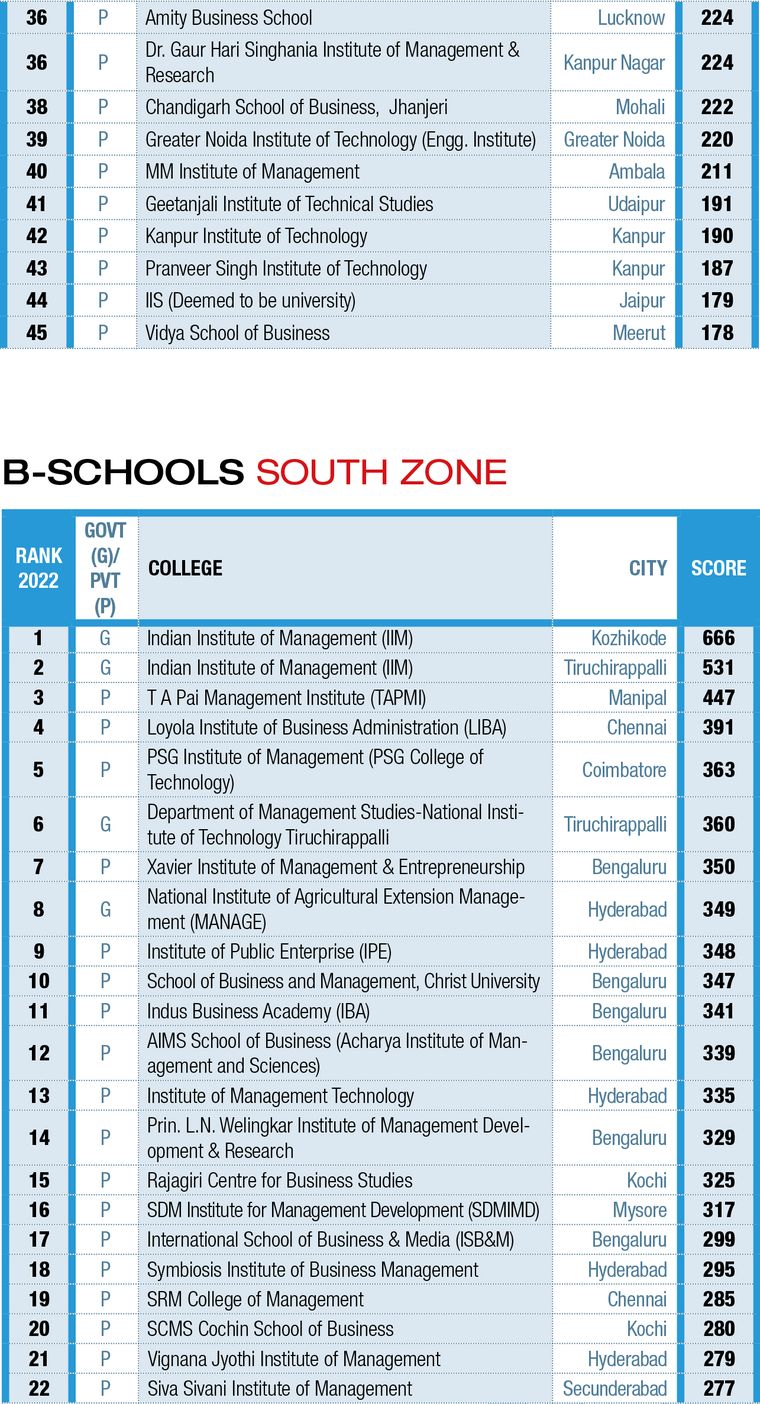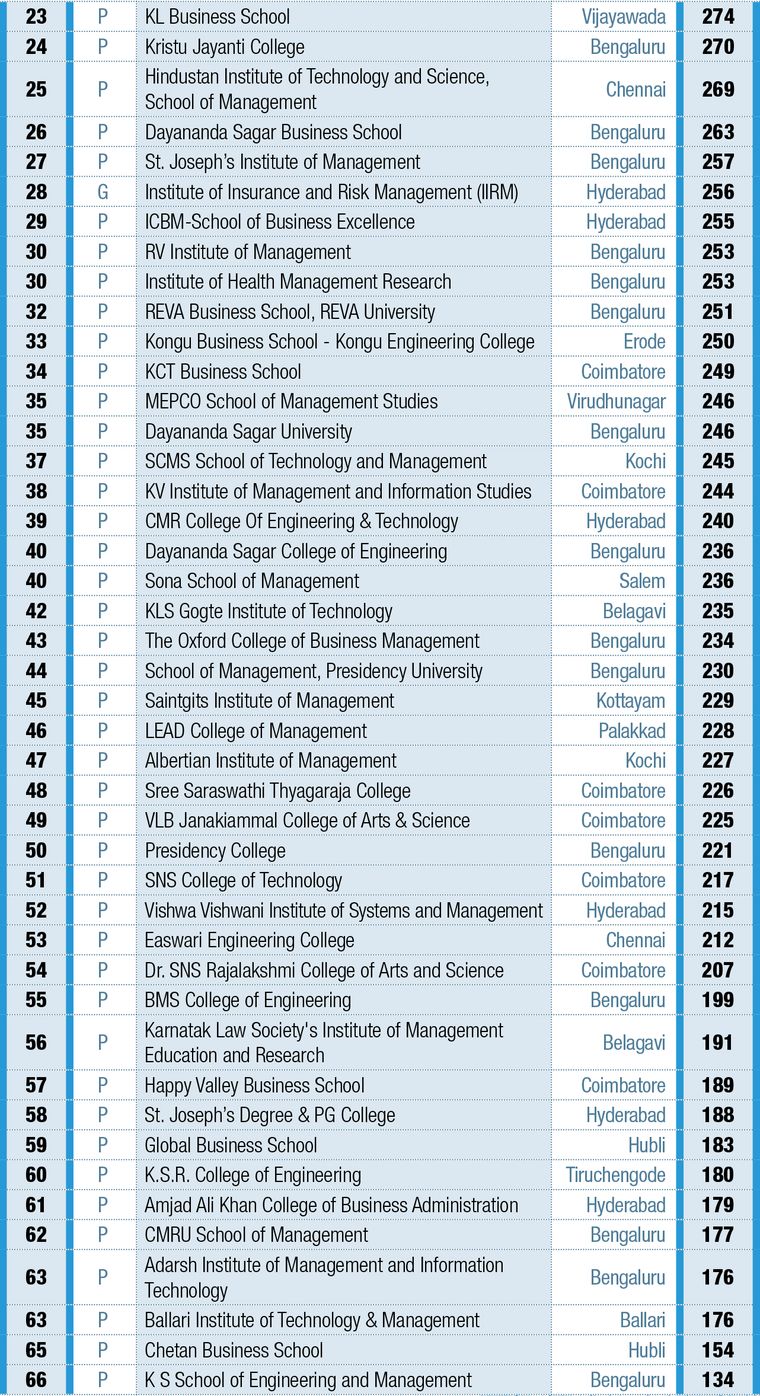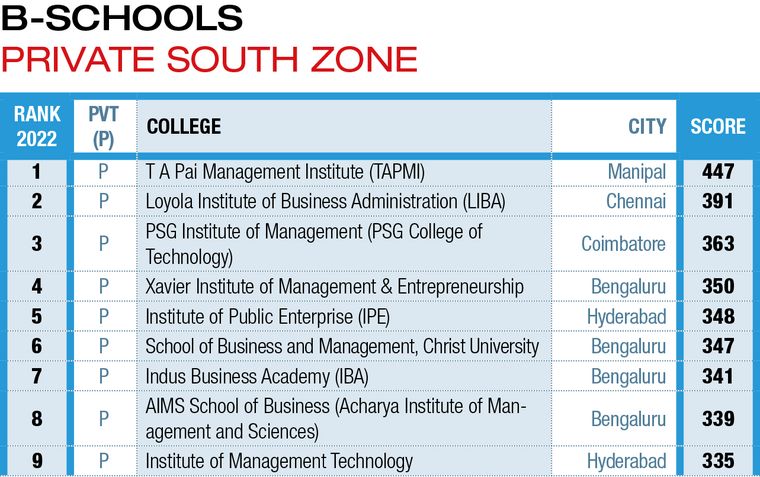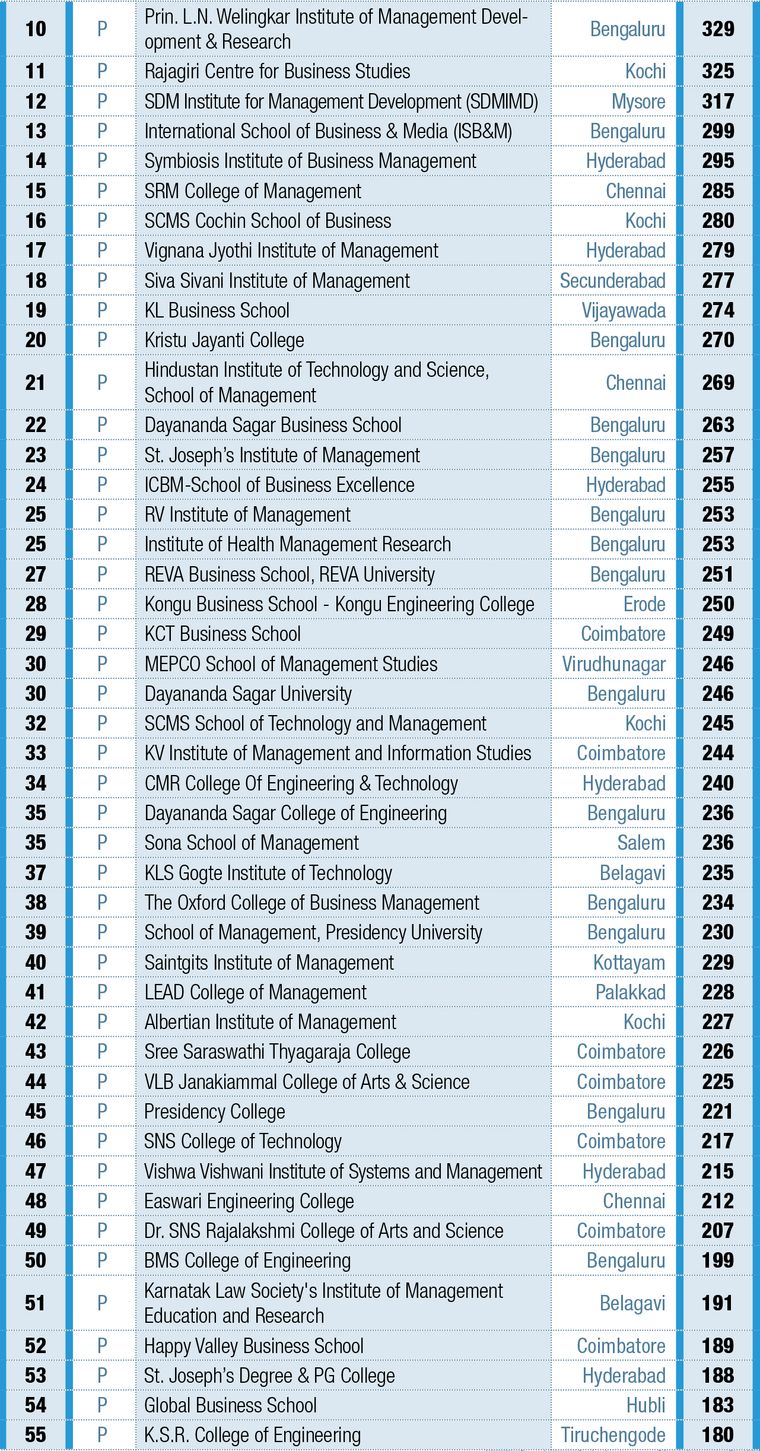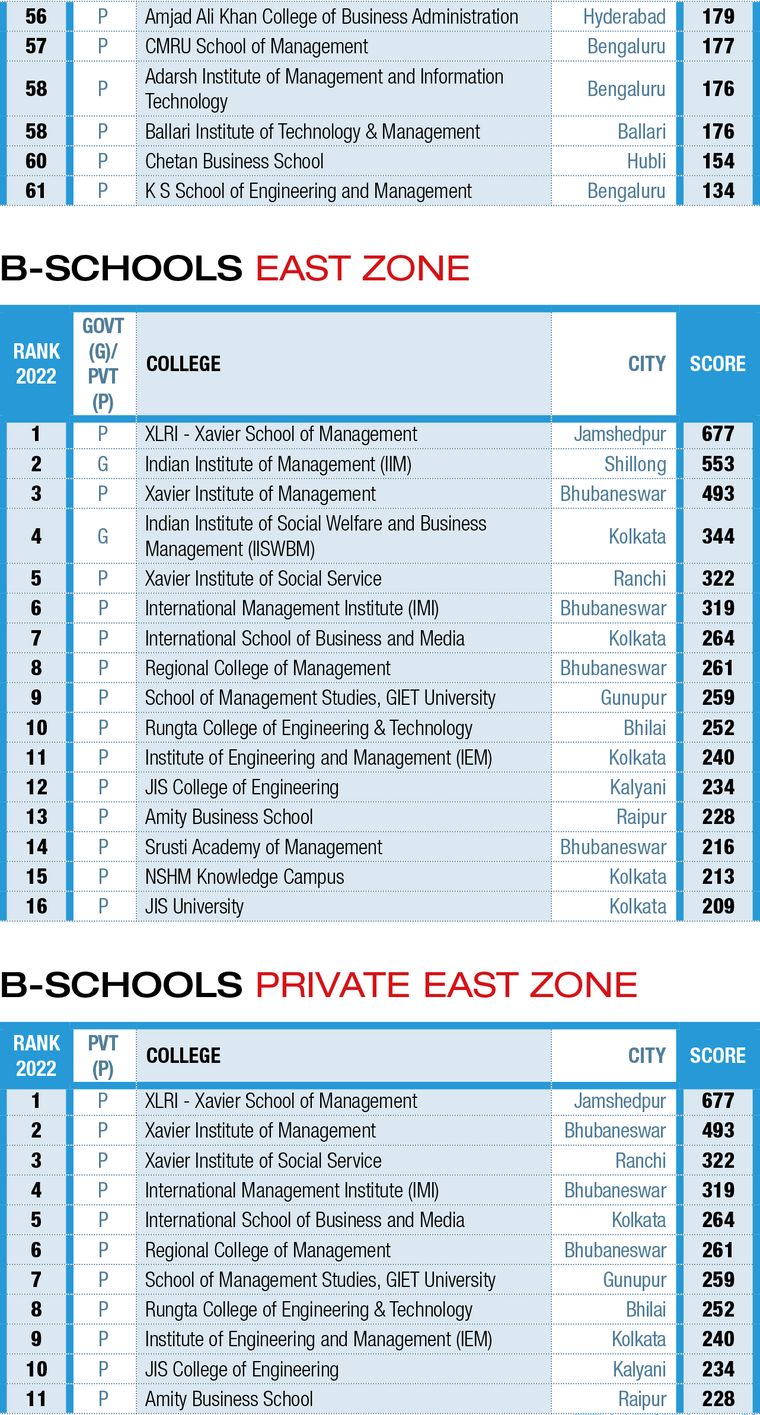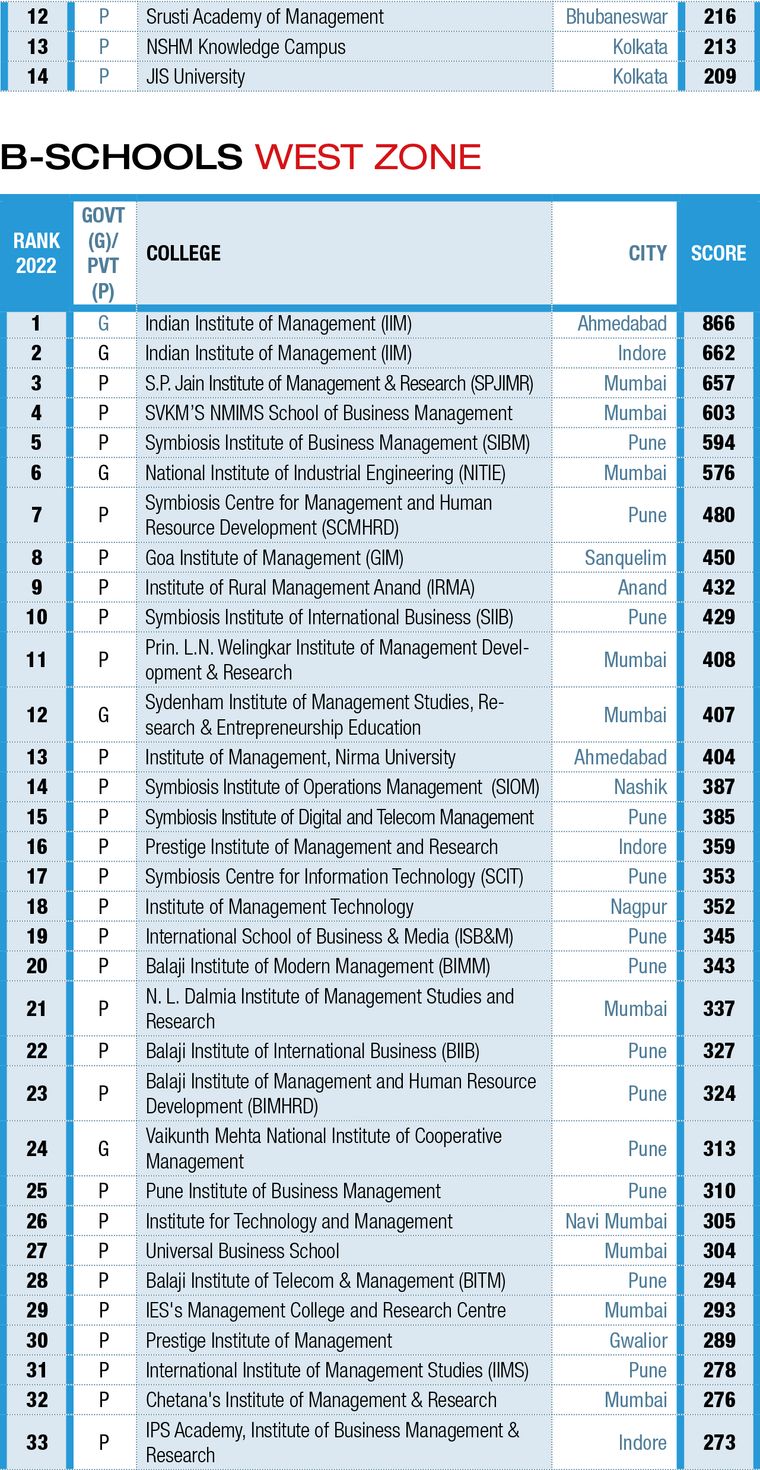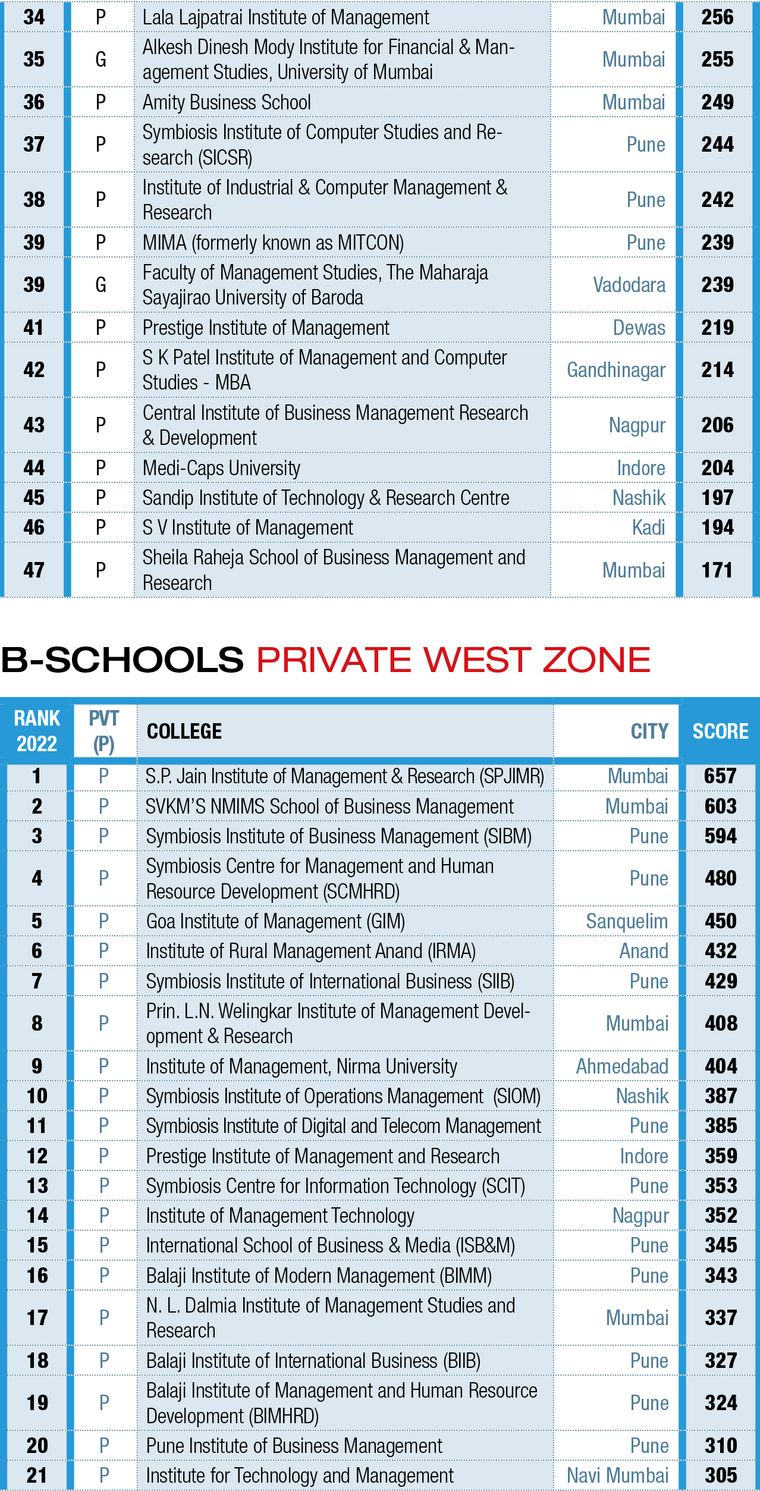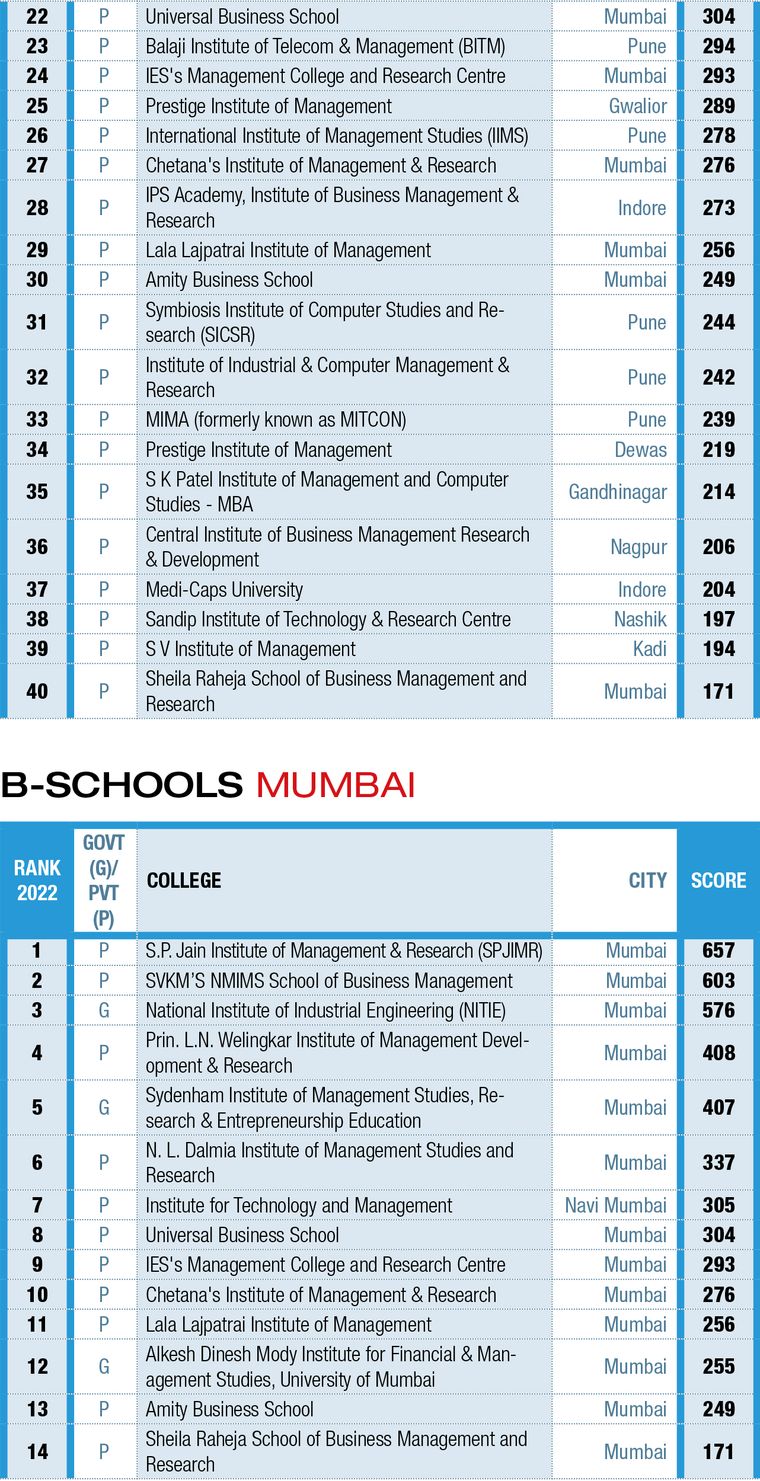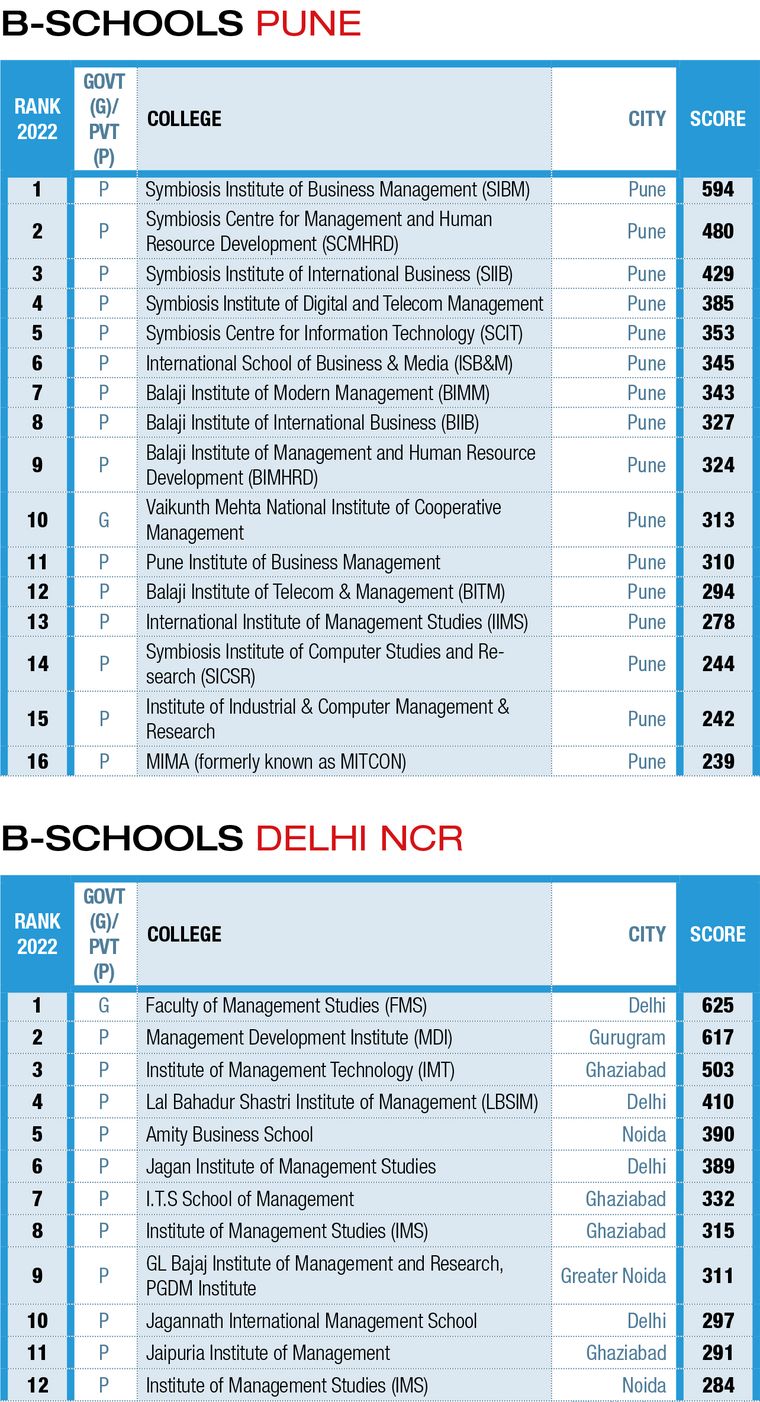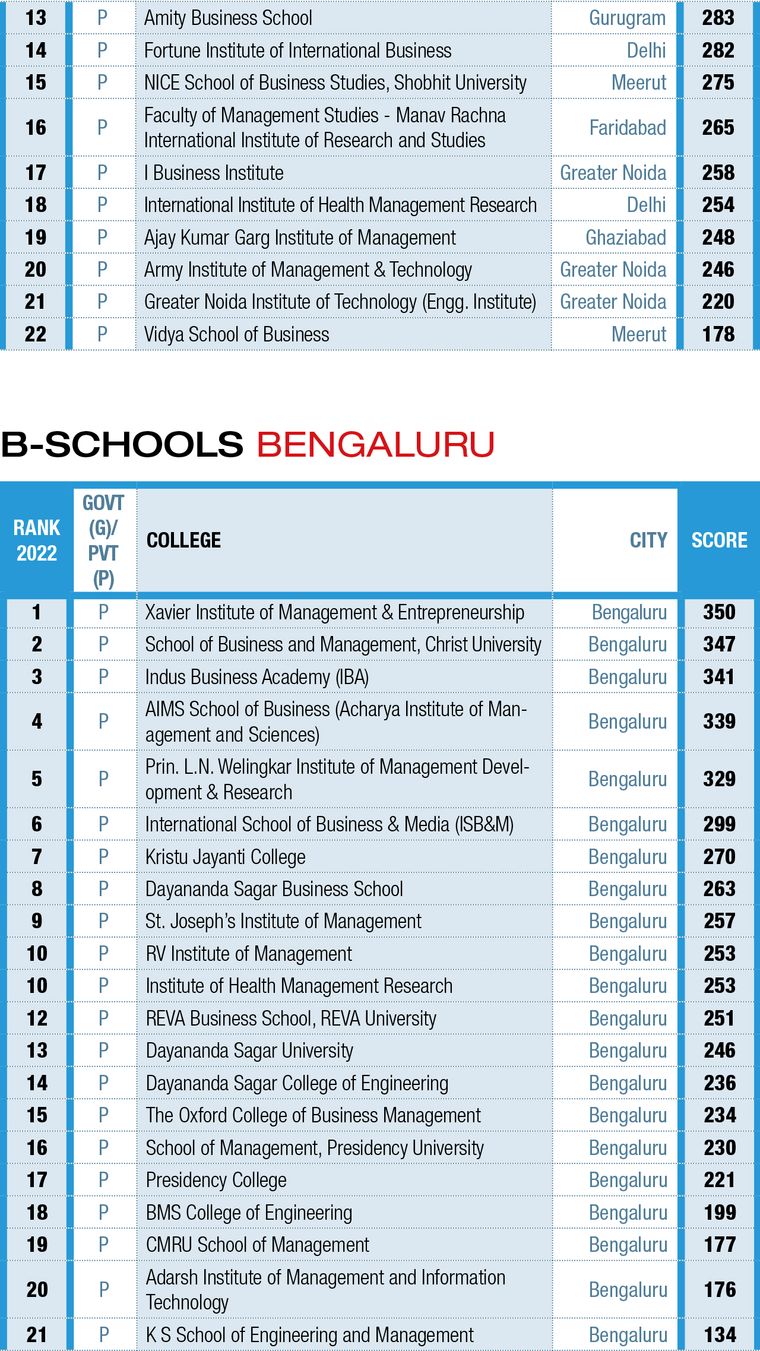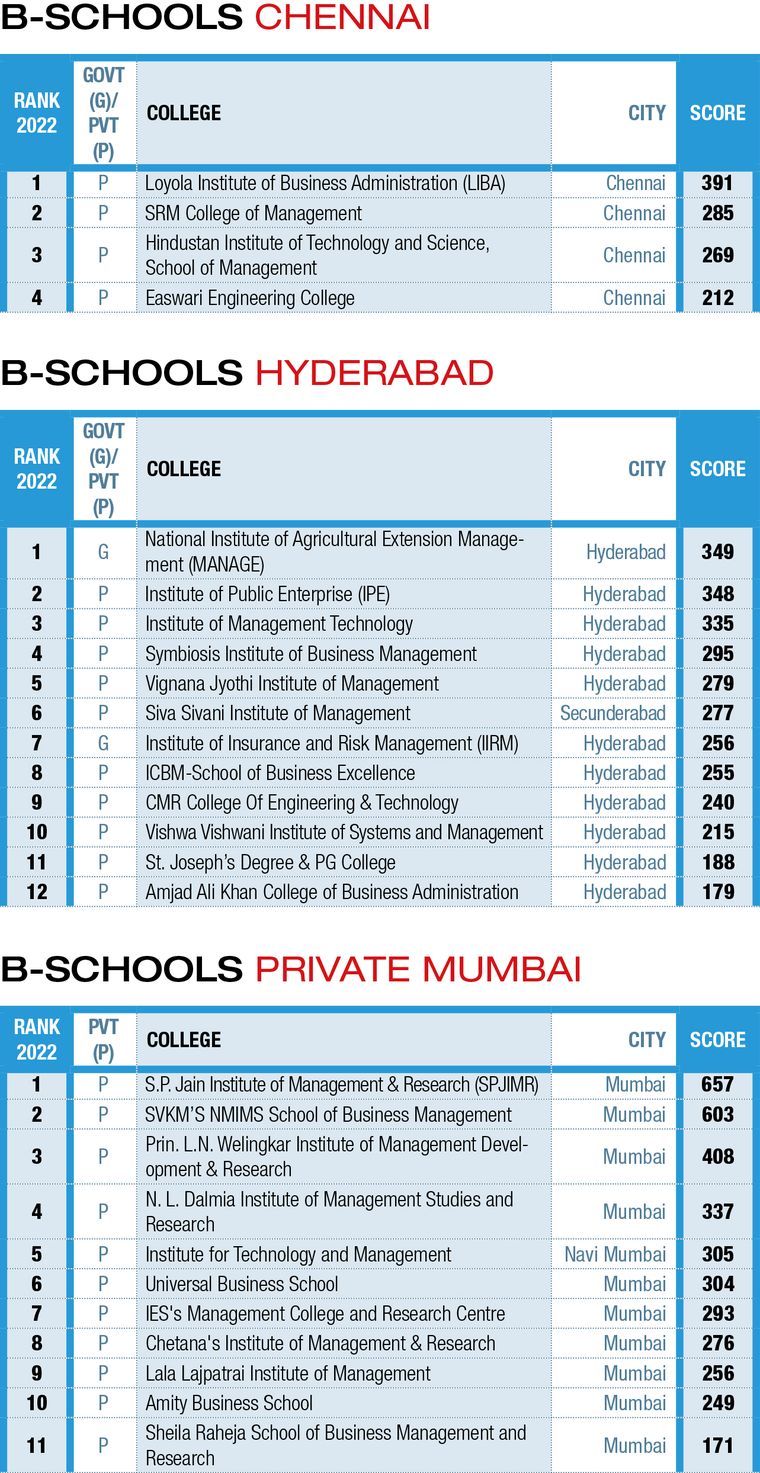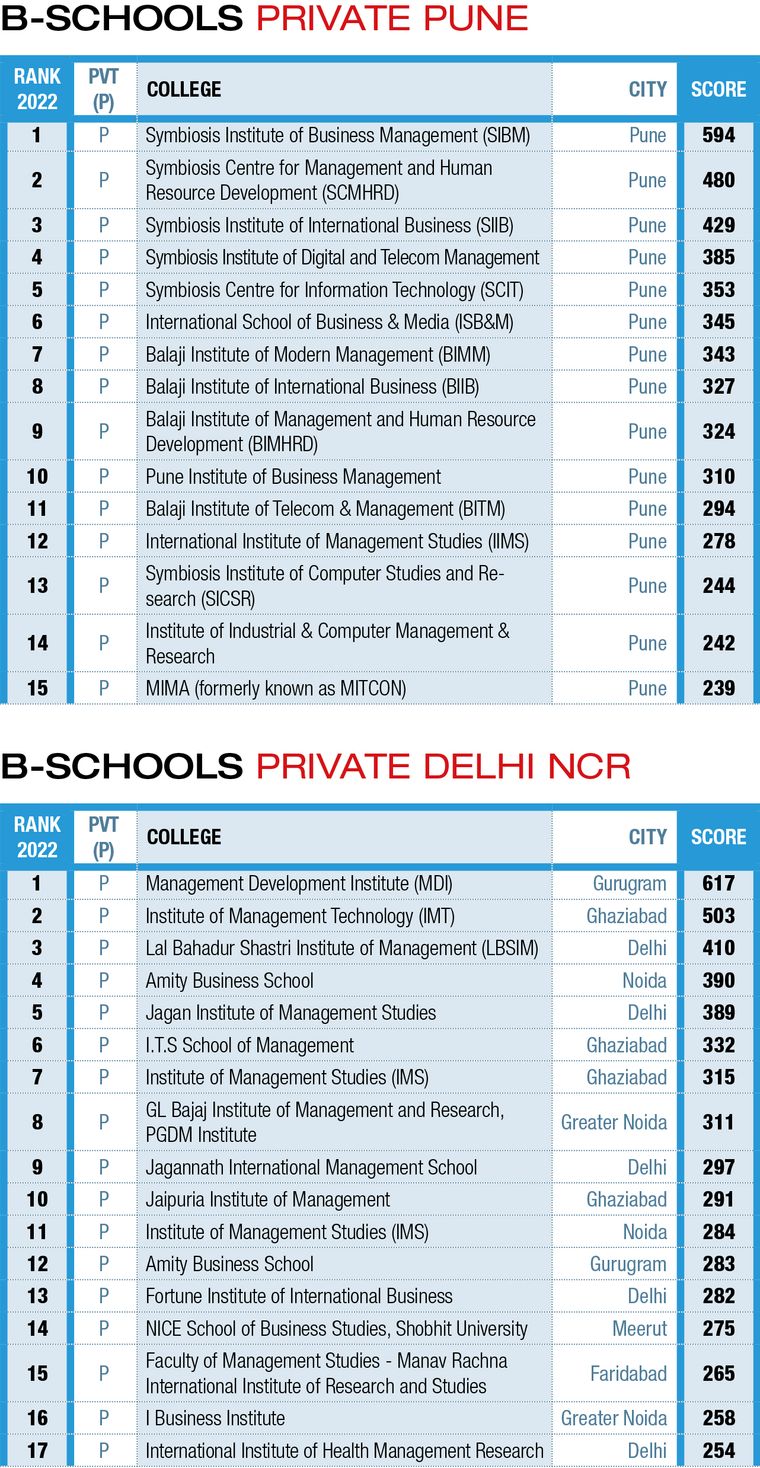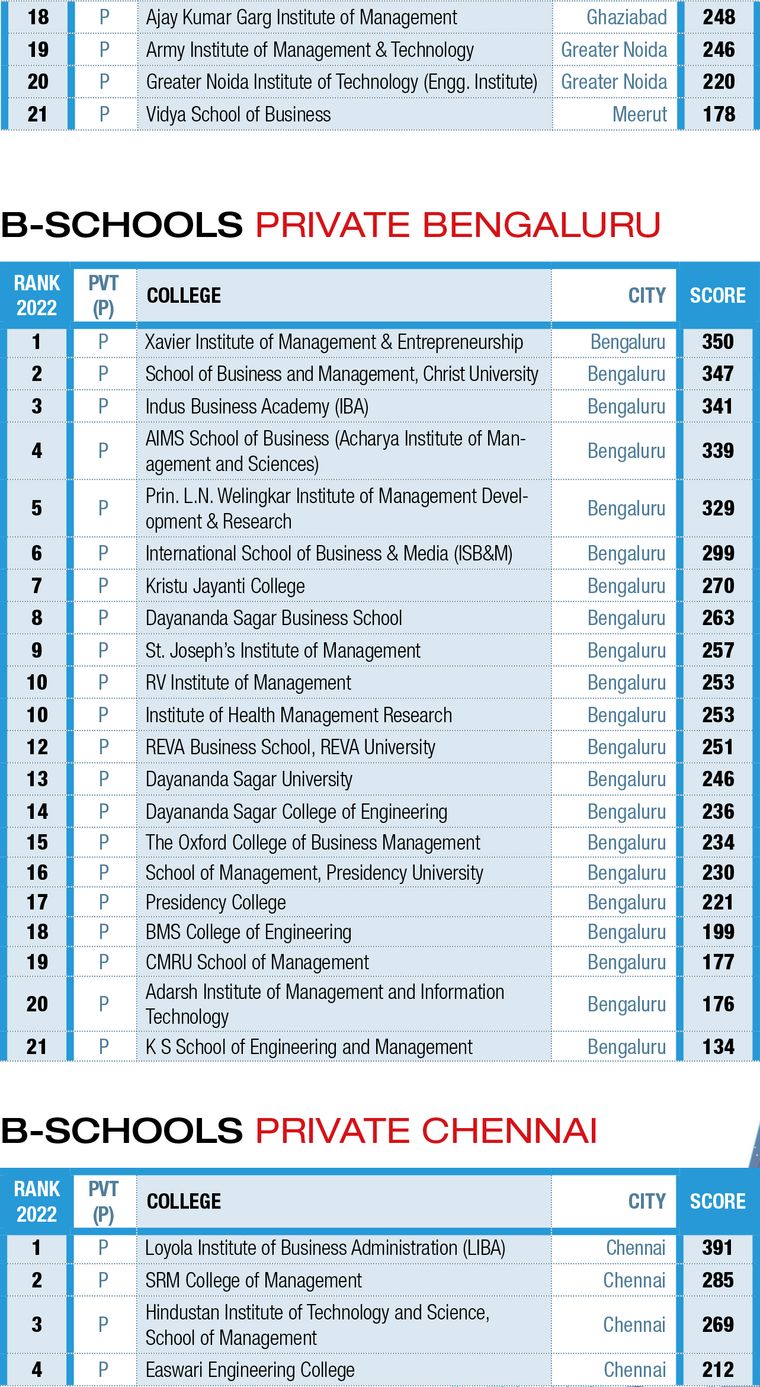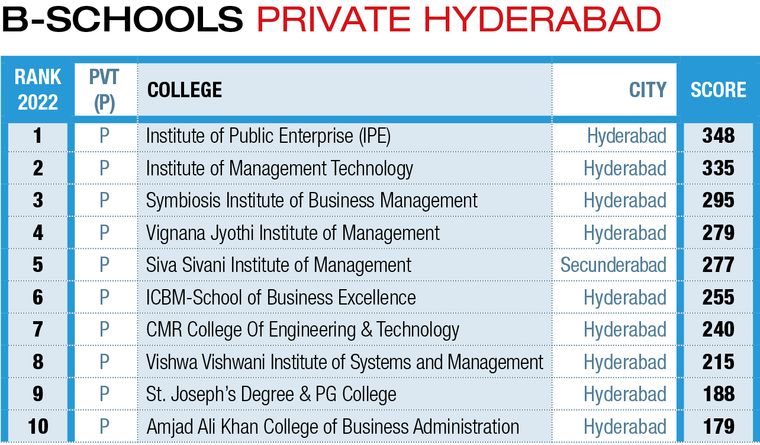The rain-soaked campus of the S.P. Jain Institute of Management and Research (SPJIMR) in Andheri, Mumbai, is buzzing with students. Some are in the canteen, others are shuttling between classes. Off-line classes are back and are now enriched by the lessons learned from the pandemic, especially with regard to disruptions and business resilience.
This adds to the experiential learning practised at India’s best b-schools. For instance, Richa Pandey, a student in SPJIMR’s postgraduate programme in management―one-year course that requires at least five years of work experience―recalls a product launch simulation in class. The considerations started right from research and development and included pricing and the launch strategy.
Pandey, who hails from Jharkhand, adds that she has been impressed by the institute’s focus on social leadership. She explains the ‘development of corporate citizenship programme’ that involves students implementing their learnings while working at an NGO. “It is not just about the academics, but the grooming of well-rounded individuals who will be ready to take up mid-management roles,” she says.
To that end, there is a focus on introducing different disciplines to the students. Dinyar Patel, assistant professor, management and society, teaches history to the would-be managers. “History is basically about debates and there is no right answer,” says Patel, who was born and brought up in the US and taught at the University of South Carolina before joining SPJIMR.
“Disciplines such as history show us that ultimately you are dealing with people. The courses which I generally teach are related to the history of economics. I also teach the history of capitalism and Indian economic history, starting from the Mughal era.” He says that since the pandemic there has been a lot of talk about decision making amid disruptions. “History helps us develop empathy and empathy is good in any administrative role,” he says.
Professor Sajeev Abraham George, chairperson of the two-year postgraduate diploma in management at SPJIMR, says: “We focus on how one can balance between financial and social objectives of any business. We also give a lot of importance to non-class room learning as we also want to influence our students towards social sensitivity.”
Emotional intelligence and leadership during crises are given more priority now in b-schools across India, with a specific focus on humanities and liberal arts courses. Professor Himanshu Rai, director of the Indian Institute of Management Indore, says: “The new management paradigm should focus on integration of conceptual, analytical and technical orientation, and social leadership aspects of education. Young business leaders should not only focus on solving business problems but also on long-term, data-driven decision making and should have continuous focus on solving major socioeconomic problems.”
Apart from the traditional theoretical underpinning of management courses, there is more emphasis on data analytics. IIM Indore recently developed short-term (six months to one year) programmes in the executive education space which focus on product development, supply chain management, health care management and data analytics, among others. It also has a newly designed programme on data science.
Rai believes that the new-age MBA will be different from the traditional MBA programme in the sense that it will demand more resilience and adaptability in line with the fast-changing business environment. “One case in this regard could be the traditional approach of business statistics, human resource management or accounting curriculum that needs a proper alignment with artificial intelligence, data sciences, human resource analytics and financial analytics,” says Rai. “Going forward, though the key concepts of management education remain the same, their application to solve a business problem will require much informed decision making.”
But, does that mean the workload of students has increased? “The workload in terms of hours remains the same,” says Rai. “The pedagogical approach, industry engagement and faculty-student collaboration for research-based education has certainly changed over time. The student workload in terms of curriculum management has been updated while keeping the credit requirements or hours the same.”
Research and innovation remains a vital part of management education. At the Symbiosis Institute of Business Management, located in lush green surroundings at Lavale, Pune, the director Professor Ramakrishnan Raman is quick to point out that the institute has got more than 60 patents in the last three years. “All the patents are in the field of techno management,” he says. “We are looking at linking technology to management aspects.”
He cites research that SIBM undertook to understand attrition, especially at mid-management level. “If people who are likely to leave can be identified, then the company can take steps to retain them,” he says. “The theory says that a person will not decide to leave an organisation in one day. They dwell over the idea for a long time. So, we pulled data such as the time taken to reply to emails and the reply itself. This helped us in reaching conclusions regarding the chance of specific people leaving the organisation. The research―linking theory to practice―is part of our classroom teaching.”
The institute’s MBA in innovation and entrepreneurship programme was launched in 2014. As the name suggests, it is aimed at supporting startups and is not geared towards placements. “This programme has a huge waiting list,” says Raman. “We have a government-funded incubator and incubation support and mentorship training. It is more of experiential learning and we have had 60 startups coming out of this programme (some have multiple students involved).”
Teaching from experience is part of the process at many top b-schools and therefore many faculty members have relevant work experience. Professor V.V. Ravi Kumar, who teaches subjects related to marketing and services at SIBM, has worked in logistics and specialises in marketing, logistics management and retail marketing. “Students today are not interested in more theoretical concepts; rather, they want industry-oriented learning,” he says. “For instance, private labels or store brands is a concept that is becoming popular in India; they are promoting their own label versus national brands. If a student becomes a marketing manager, he or she would benefit from learning how to develop a marketing strategy and how to promote a private label versus a branded label.”
The pandemic has been linked to a change in the approach of b-school students. They now demand greater exposure to situations and prefer to undertake live projects (voluntary part-time internships) with faculty guidance in order to learn business uncertainties, risks and other emergent issues. Professor A. Venkat Raman from the Faculty of Management Studies, University of Delhi, says: “Though conventional classroom sessions continue to dominate management education, more eagerness (among students) is shown in learning from live situations. Students with work experience are increasingly enrolling in the MBA programme, providing opportunities for their classmates to benefit from their experiences.”
Venkat Raman adds that though the published syllabus may be slightly dated, at least in some cases, the classroom discussions are as contemporary as needed. “B-schools are also encouraging students to learn add-on online courses in subject areas which are specialised and niche, and are not feasible to include in a structured curriculum,” he says.
The salary packages for b-school graduates continue to be impressive. For instance at XLRI, India’s top-ranked private b-school (IIM Ahmedabad’s 2022 final placements report has not been released till end of October), the average salary for the 2020-2022 post graduate diploma in management batch increased to Rs30.7 lakh per annum from Rs23.91 lakh per annum in 2020.
However, salary alone is not enough to entice students at the top b-schools. Things have changed for recruiters in terms of proposing roles to candidates, who have become more sensitive to the overall value proposition in the organisation. “They are keen to know about work life balance, mental well-being and working hours,” says Nagraj Vasan, head, talent acquisition, KnowledgeHut upGrad, an edtech company. “Recruiters need to be more hands-on in knowing the organisation and vocal about what is there for the candidates.”
Human resource management experts and trainers believe that the new-age MBA is more hands-on and emphasises experiential learning, and that specialisations have become more relevant. “Experiential learning shortens the learning curve and enhances the employability factor, which is appreciated by recruiters,” says Sumit Kumar, chief business officer, TeamLease Degree Apprenticeship. “Creative thinking and solution mindset are two traits that will be appreciated.”
He feels that management students should work on adaptability and learnability. “Be curious and hungry to learn more, get exposed to as many situations and be part of as many projects as possible,” he says. “This will help one build a solid foundation. And adaptability is important for survival and growth.”
Earlier, managers could spend their entire career with a single function like marketing or finance. But, the leaders of modern enterprises are looking for managers capable of leading across the boundaries of functions and hence the curriculum of the modern MBA degree becomes key. “New-age leadership skills are critical in the current workplace environment,” says Sekhar Garisa, CEO, Monster India. “Analytical and critical thinking, flexibility, metacognitive skills (awareness and understanding of one’s own thought process), collaboration skills, adaptability, problem-solving and communication are the most important multidisciplinary skills for today’s managers. In the digital era, these skills have become essential given the shift to remote working and rising employee attrition observed across the globe.”
Apart from technical skills, Garisa adds that efficient time management and effective networking goes a long way in furthering management careers.
SUBIR SEN, principal, NSHM Business School, Kolkata
MBAs in India need to be hands-on doers, rather than planners, thinkers or policy makers like their counterparts in developed countries such as the US. This is because in the developed countries, systems and processes, including technology, take care of the implementation. But India being an emerging market, this is where the action is.
JOSEPH MARIANUS KUJUR SJ, director, Xavier Institute of Social Service, Ranchi
The new-age MBA has courses on mental health and behavioural sciences. Attention is paid to artificial intelligence, blockchains, and digital marketing. Students should be more confident and have perseverance. They should be groomed to be mentally and emotionally strong which has been an area of concern post Covid-19.
KIRAN REDDY, founder principal, AIMS Institutes, Bengaluru
There are significant changes in the new-age MBA course as compared with older courses. Updated and new courses have been included as per the current needs in the industry. For example, there are more course objectives and outcomes even for the courses in the first semester. Skill development activities have been added.
A. NAGARAJ SUBBARAO, dean, School of Commerce and Management Studies, Dayananda Sagar University, Bengaluru
In the past, there was a great emphasis on lectures, rote learning and memorising facts. All that is gone. The student is entering a world where the requirements are broad knowledge across areas, an agile and curious mind, steadfastness and confidence to stare at a problem and offer meaningful, well-researched solutions and eventually be accountable for mistakes, and show high calibre leadership and ethics.
ANJALI KAUSHIK, dean (strategic initiatives), Management Development Institute, Gurugram
The most essential component of management education is the development and enhancement of a student’s analytical and critical thinking abilities. The primary goal of an MBA programme is not only to prepare students for the specified management course but also to equip them to administer critical positions with acceptable leadership traits throughout life.
UDAY SALUNKHE, group director, S.P. Mandali’s WeSchool
With quantum change in businesses, as a b-school, we believe that MBA programmes need to revitalise their offerings and pedagogy. Outcome driven and implementation-based learning ecosystems, building capabilities to grow new businesses ground up and alignment of strategy to ESG (environmental, social and governance) goals are metrics for building sustainable and relevant management programmes.
SULAGNA DAS, associate professor, JIS University, Kolkata
The demand for executives with a mix of managerial and technical skills has increased. Also, students need to develop their critical thinking abilities, and one of the most crucial multidisciplinary skills is the ability to examine other points of view and start comparing and contrasting ideas. A person must be capable of switching between various lenses at the appropriate time.
DIVYA AGGARWAL, associate dean, International Institute of Health Management Research, Delhi
Post Covid-19, all management education has to be a mix of online and offline teaching methods. The current and future managers have to be well-equipped with knowledge of disaster management and technological innovations as it helps business sustain during any contingencies. As today’s world is all data driven, the analytical and technical skills of budding management professionals should be fine-tuned.
VANDANA ARORA SETHI, group director, chief strategy officer and head of growth, Lloyd Group of Institutions
Having the acumen to get the job done is not enough. As an effective manager, one should learn valuable multidisciplinary skills like critical thinking, self management, adaptability, problem-solving, analytical thinking, communication and flexibility. At large, managers should not just be leaders, but lifelong learners.
Monica Khanna, director, K.J. Somaiya Institute of Management, Mumbai
The future of b-schools would be defined as being those institutions that develop highly ethical and transformational leaders who have a deep appreciation of environmental, societal, global and local concerns, and are highly adaptable.
C. JOE ARUN SJ, director, Loyola Institute of Business Administration, Chennai
All our programmes are designed to focus on holistic growth and forming responsible leaders with a global perspective. This is embedded in every module of the courses which highlights the importance of the human element in every aspect of decision-making.
THE WEEK HANSA RESEARCH BEST B-SCHOOLS SURVEY 2022 RESEARCH METHODOLOGY
PERCEPTUAL OPINION COLLECTION
A primary survey was conducted in August-September 2022, where 200 academic experts, 635 current students and 35 recruiters from 15 Indian cities nominated the best b-schools in the country. The cities selected were major education hubs in the country.
A closed-ended questionnaire was given to stakeholders, asking them to nominate and rank the top 25 b-schools in India and the top b-schools in their zones.
PERCEPTUAL SCORE
Calculated based on the number of nominations received and the actual ranks given to the b-school in the All India category and in its zone.
FACTUAL INFORMATION COLLECTION
A dedicated website was created as an interface and the link was sent to more than 1,400 b-schools, of which 181 responded on time. Four b-schools were rejected because they did not meet the eligibility criteria (the institutes had not passed three batches or had admitted less than 40 per cent of the sanctioned intake). Factual data from the remaining 177 b-schools was used for the rankings.
FACTUAL SCORE
Information collected from the b-schools was combined by applying appropriate weightage to each parameter as given below:
Parameter Weightage
Overall infrastructure 20%
(Includes accreditations and safety measures like women’s grievance redressal cell)
Faculty 12.5%
(Includes teacher-student ratio, and publications and consultancy by faculty)
Teaching-learning
and extracurricular 30%
(Includes work experience and diversity of students, and alumni base)
Placements 37.5%
(Includes average salary and average internship stipends)
RANKING METHODOLOGY
Ranking is based on a composite score, derived by combining the perceptual score and the factual score. For b-schools that could not respond within the deadline, the composite score was derived by combining perceptual score with an interpolated appropriate factual score based on the position of these b-schools in the perceptual list. However, some top b-schools, like IIM Bangalore and IIM Calcutta, opted out and did not confirm whether they wanted to be listed based on perceptual scores. In such cases, the b-schools were omitted from the ranking.



